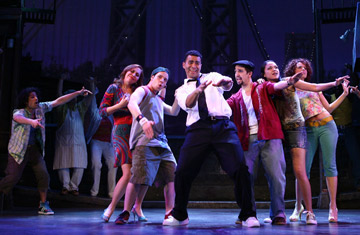
In the Heights uses hip-hop and salsa to animate its family-friendly tale about the residents of a Latino neighborhood on the verge of change
(2 of 2)
"In their heart of hearts," says Stew (real name: Mark Stewart), the creator and composer of Passing Strange, "I think every rock-'n'-roll guy who always laughs at the American musical in truth wants to write a musical. You don't want to be with a touring band every night. And it gives you a chance to tell a story." A native of Los Angeles who has been recording albums and doing cabaret shows with his band, the Negro Problem, for the past 10 years, Stew, 46, had seen only one musical--How to Succeed in Business Without Really Trying--when he started writing Passing Strange three years ago. The loosely autobiographical show recounts the artistic journey (in scenes acted, sung and danced by a full cast) of a young man from a middle-class L.A. neighborhood to the drugs-and-free-love wonderland of Amsterdam and a radical artistic commune in Berlin.
Dramatically, the show feels a little padded (shorter stays and another stop on this tour might have helped), but musically, it's original and extraordinarily winning. Stew, a bald, bespectacled guitarist who leads the band and narrates, is a professorial presence onstage whose flat, prosy singing voice gives an ironic grounding to the lyrical, gently rocking melodies. He's a model of a new kind of stage composer, one neither steeped in Broadway tradition nor reacting overtly against it. "Without casting any aspersions," says Stew, "I don't think most of the so-called rock onstage sounds like anything my friends and I would listen to. We wanted to take the music we do on records and in clubs and put it on the American stage--music that people want to listen to, the stuff you put on when friends come over."
Lin-Manuel Miranda, 28, the conceiver, composer, lyricist and star of In the Heights, had a bit more experience with musicals than Stew did--he got what he describes as a "lethal dose of musical theater" while acting in shows at his New York City grade school (the short Puerto Rican sixth-grader played Conrad Birdie in Bye Bye Birdie). He started writing In the Heights when he was living in the Latino house at Wesleyan University in Middletown, Conn., incorporating the hip-hop that he had grown up listening to as well as the Latin styles of favorite artists like Rubén Blades, Gilberto Santa Rosa and Juan Luis Guerra. "I wanted to write music that told stories as well as those songwriters tell stories," he says, "but onstage."
The result is a warm, upbeat slice of street life set in the largely Dominican neighborhood of Washington Heights. Miranda, the narrator, plays the proprietor of a bodega in the shadow of the George Washington Bridge, introducing and interacting with a dozen characters, from the college girl who disappoints her parents by dropping out of Stanford to the aging neighborhood matriarch who wins $96,000 after buying a lottery ticket. Miranda's songs glide effortlessly between mellow hip-hop, salsa dance numbers and Latin-flavored arias that express the frustrations, dreams and community pride in Miranda's family-friendly world. No pimps or drug dealers on these mean streets; In the Heights is both a hip and an improbably wholesome show, whose moral--like that of Passing Strange--is "There's no place like home."
Indeed, In the Heights might even be regarded as the first musical of the Barack Obama era. It represents change on Broadway. It's a show full of hope. And it has its producers--and a lot of other people who want Broadway to reach out to new audiences with contemporary, heartfelt shows like these--crying "Yes, we can."
REPLACING RENT? Hear Richard Zoglin talk about Broadway's rock musicals, and listen to excerpts from the shows, at time.com/rent
